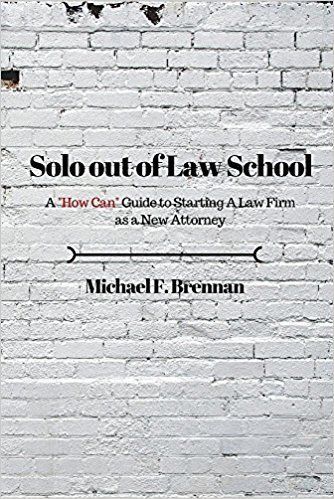An Excerpt from Solo Out of Law School
"Tune out the Negative Speak"
The following is an excerpt from "Solo Out of Law School--A How Can Guide to Starting a Law Firm as a New Attorney"
Solo out of Law School is a book for both law students thinking about a solo career and attorneys looking to open their own firms. It's about mindset, motivation, and viewing your solo career with perspective that allows you to see yourself and your work as something you can be proud of. It's not a "how to" guide to starting a law practice. It doesn't say anything about the tools you'll need or whether to open a brick and mortar office. Rather, it's a "how can" guide to developing the mental toughness and right mindset to succeed as a solo attorney. It's a collection of little lessons and simple reminders for when your choice to go solo in the first place come into doubt. Solo out of Law School is about finding the strength and motivation to keep pushing. By embracing the words on its pages, my hope is that you'll realize, no matter how much you doubt yourself or second-guess your actions, you are good enough to be successful as your own boss.
If you’re reading this book, then you are probably thinking about starting a law firm. Congratulations on even getting to this point of consideration! That alone is a huge step towards the metaphoric ledge from which you are thinking about inevitably leaping.
Tune out the Negative Speak
Let's get one thing out of the way right from the beginning: There is never a good time to start a law firm. Life has a funny way of creating all sorts of excuses that make it easy for us continually to put things off until the very inspiration we had to start something new—perhaps even revolutionary—fizzles away like a teapot losing steam.
It’s human nature to doubt ourselves, our skills, and our abilities to succeed. For you, that could be a fear of not being able to support your two young children, or maybe it's a worry that your friends will look at your decision to strike out on your own as an indication that you were not "good enough" to get one of those plush Big Law jobs.
Here’s what you need to remember: If everyone thought that going to law school, spending tens (if not hundreds) of thousands of dollars on education, and spending countless hours with your head buried in books and outlines just to say "no thanks" to becoming a big-shot lawyer sounded smart, they would be doing it. If everyone thought what you are about to consider doing was an excellent idea, then they would be doing it themselves.
People are going to doubt you. People are going to critique your decision to open up your own shop, and they are going to let you know about it. To be honest, one of those doubters from time to time is going to be you.
A harsh reality? Yes. One that you can weather? Absolutely. Being in business for yourself means that you are going to need to have incredibly thick skin. You’re going to need to let things roll off your back, because at the end of the day, no one’s views matter except for yours. People are going to judge you regardless of what you do, so it's best to accept that and forget about it.
You are no doubt reading this book for a reason. Whether you're passionate about a growing niche area of law, you think that billing 2200 hours a year at a large firm sounds like the easiest way to drive yourself to an early grave, or you just can't find work anywhere else, you've no doubt had at least a passing thought that starting your own firm may be your best chance at happiness and prosperity. You may have ideas on how to make the law more accessible to clients or more responsive to industry needs. You probably want to do things cheaper, faster, or more efficient than the established law firms that are already out there.
If everyone shared that same belief, they would be doing it too.
If you can’t convince yourself that your reasons for wanting to start a law firm are valid, then you have set yourself up for failure before even getting started.
So, forget what other people think and stop worrying about what they may be saying. Most importantly, turn off that little voice in your head telling you that you can't do it and that you're going to fail. If you can't have confidence in yourself, you are destined to fail. You might as well realize that now because you are going to be your biggest cheerleader for the foreseeable future, so get on your good side now before things get tougher.
Think about why you want to start a law firm in the first place. Whether it's the freedom to work with the clients you want or the ability to make it to all of your daughter's soccer games, put that thought in the front of your mind and keep it there. Positive inspiration becomes your best friend when the road gets bumpy.
Michael F. Brennan is an attorney at The Virtual Attorney™ a virtual law office helping clients in Illinois, Wisconsin, and Minnesota with estate planning and small business legal needs. He can be reached at michael.brennan@mfblegal.com with questions or comments, or check out his website at www.thevirtualattorney.com .









